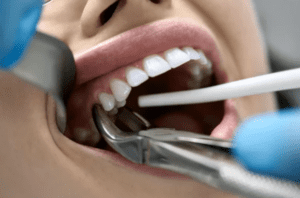If you have recently had a tooth extracted, your dentist may warn you about a condition called “dry socket.” Dry socket is a painful condition that can occur after the extraction of a permanent adult tooth. After your dentist extracts your tooth, a blood clot will form in order to stop the flow of bleeding.
If the blood clot falls out or dissolves before your extraction site heals, you can experience severe pain. The premature removal of the blood clot is what causes dry socket.
You can avoid dry socket by following the post-surgery care instructions from your dentist. While it is a common complication, it is one that you would want to avoid.

What Causes Dry Socket Pain?
A blood clot forms over an extraction site after surgery to stop the flow of bleeding. This blood clot also creates a protective layer of the exposed bone and nerve. Additionally, a blot clot will provide a space for new soft tissue to develop.
When the clot dissolves or removes prematurely, the nerve endings become exposed. Unfortunately, this results in severe pain for you. This pain is not limited to the exposed socket because it can radiate to other parts of your face. This is due to the fact that nerve pain is generally intense. Nerve pain can travel across your face and into your neck.
Dry socket typically happens one to three days after the initial extraction. Along with extreme pain, you have to worry about inflammation and food particles getting trapped in the healing wound. If you do not remove food particles from the extraction site, you could risk an infection developing.
What Are The Symptoms of Dry Socket?
The pain from dry socket is hard to miss. After a few days, you can start to develop extreme pain that you may feel in more places than just your extraction site. You may experience nerve pain up to your temple, in your ear, or down into your neck. Typically, you will feel this on the same side of your face as the tooth extraction.
If you have a dry socket, you will be missing some or all of the blood clot that attempted to form. With the blood clot gone, you may be able to see an “empty” socket. Also, the bone may be visible. It may be scary or gross looking, but your dentist will be able to help.
Other symptoms of dry socket include bad breath or a bad smell coming from your mouth. In addition, a dry socket may leave a bad taste in your mouth.
Is It Time to Call Your Dentist?
It is normal to experience some pain or discomfort after a tooth extraction. You are undergoing a type of surgery where a dentist removes a portion of your mouth. If you take your prescribed medications as directed, the pain should be minimal. After a while, the pain should subside. However, if the pain is unbearable or if it gets worse over time, you should contact your dentist immediately.
